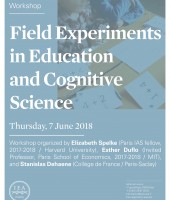Field Experiments in Education and Cognitive Science
Workshop organized by Elizabeth Spelke (2017-2018 Paris IAS fellow / Marshall L. Berkman Professor of Psychology, Harvard University), Esther Duflo (Abdul Latif Jameel Professor of Poverty Alleviation and Development Economics, MIT. Invited Professor, Paris School of Economics, 2017-2018. Co-founder and Co-director, Abdul Latif Jameel Poverty Action Lab), and Stanislas Dehaene (Chair in Experimental Cognitive Psychology, College de France, and Director, Neurospin, CEA Saclay)
Presentation
Cognitive Science has made considerable progress in understanding the nature and development of the basic cognitive skills that are central to learning to read, to express oneself in oral and written form, to reason with spatial symbols and tools such as graphs, rulers, and scales, and to master elementary school arithmetic, geometry, and basic algebra. Nevertheless, cognitive science has had little success, thus far, in translating these gains into school curricula that yield better learning outcomes for children. One reason for its limited success stems from the very different circumstances in which children's learning is studied in laboratories, relative to the settings in which children's learning actually occurs. Research in cognitive science primarily takes the form of brief experiments conducted on children in quiet laboratories, where a child faces a computer or a single, unfamiliar experimenter, without peers or teachers. Moreover, children are tested under conditions that minimize distraction and control systematically both the problems children are given and the resources available to solve them. These studies can reveal a great deal about what children know at different ages, and how children learn over short time spans. In contrast, mastery of reading, mathematics, and other school skills takes place over years, not brief lab sessions; it occurs in noisy environments, not empty rooms, in which children are faced with multiple challenges at once; and it happens in social contexts that are sometimes distracting, but that can facilitate children's learning through communication and collaboration with adults and peers. These considerations call for research efforts to bridge the gap from lab to classroom: field experiments that bring the rigor of research in cognitive science and economics to the homes, preschools, and primary schools in which children learn.
Our one-day workshop will focus on the conceptual and practical challenges and questions faced by such field experiments, and it will explore ways to meet them. First, how can we best measure whether an educational intervention is successful? Educational evaluations tend to focus on overt performance, judging (e.g.) that a child has mastered arithmetic if she can produce the correct answers to a set of arithmetic problems. Cognitive scientists, in contrast, would argue that a child who simply has learned to memorize the correct answers to arithmetic problems may have no understanding of the fundamental concepts and relations of mathematics. Can cognitive science support the design of more meaningful and useful measures of school mastery in the domains of mathematics and reading?
Second, how can we best design interventions that build on preschool children's preexisting knowledge and connect that knowledge to the concepts, symbols, and rules used in teaching math and reading in schools? Will children learn best from interventions that take the form of games that engage children and exercise their intuitive cognitive skills, or of exercises that focus on the material to be learned and drill children until it is mastered? In either case, if learning is to be meaningful, school curricula must bridge from children's intuitive understanding to the symbolic material they must master. What are the most effective means to do this?
Third, what are the best contexts and media for administering interventions based in cognitive science? Most school interventions use digital devices such as tablets to train children individually, at home or in classrooms. Tablets have the virtue of adapting the problems they present to the capacities of the individual child, based on her performance, and of reducing the demands on parents and teachers, but they also have potential downsides. They remove children's learning from social contexts that can be beneficial: when children communicate with one another or with adults, they may make more explicit and accessible the concepts that guide their reasoning. Moreover, although digital devices allow for detailed monitoring of children's performance, it is not clear whether, or under what conditions, parents and teachers will avail themselves of this opportunity, and when instead they will leave the child's training entirely in the hands of the personally adapted digital device.
We hope to discuss these and other questions at the workshop, together with colleagues from diverse disciplines who approach these questions from different perspectives.
Program
9:15 - 9:30 Introductions
9:30 - 10:15 Orazio Attanasio (F.B.A., Jeremy Bentham Professor of Economics, University College London. Research Director at the Institute for Fiscal Studies, London. Co-director, Centre for Evaluation of Development Policies), on challenges faced by efforts to evaluate interventions to enhance human development in poor countries
10:15 - 11:00 On the challenges of assessing conceptual development from infancy to toddlerhood: ongoing studies on typical development and planned work on immigrant and refugee populations
Gustaf Gredeback (Professor of Developmental Psychology, Uppsala University. Manager, Uppsala Child and Baby Lab)
11:00 - 11:30 Break
11:30 - 12:15 Interventions to aid literacy: Bringing cognitive science to the classroom
Johannes Ziegler (Director, CNRS Cognitive Psychology Laboratory, University of Aix-Marseille)
12:15 - 13:00 Street smart or school smart? The arithmetic skills of working children in two Indian states
Abhijit Banerjee (Ford Foundation International Professor of Economics, MIT. Invited Professor, Paris School of Economics, 2017-2018. Co-founder and Co-director, Abdul Latif Jameel Poverty Action Lab)
|
|
|
Every child counts: Enhancing the literacy and numeracy of poor children 01 September 2017 - 31 January 2018 |
|
|

